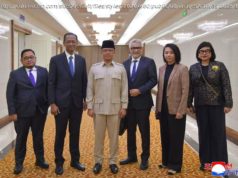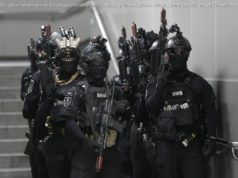After a warm welcome in Poland, Trump’s European visit gets more difficult, with terrorism, North Korea, immigration and climate change on the agenda.
WARSAW — After a warm welcome in Poland, President Trump’s European visit gets significantly more difficult with two days of meetings on some of the world’s most difficult problems: Terrorism, North Korea, immigration and climate change.
For a president who values face-to-face negotiations, Trump has some of the most challenging foreign policy meetings of his six-month-old presidency lined up this weekend in Hamburg, Germany, where world leaders are gathering for the G-20 summit. They include:
► Russian President Vladimir Putin, whom U. S. intelligence agencies accuse of orchestrating a campaign of cyberattacks and fake news to hijack the 2016 presidential election to get Trump elected. Multiple congressional committees and a special counsel are now investigating Russia’s interference and possible collusion with Trump campaign associates.
► Chinese President Xi Jinping, whose warm relationship with Trump — forged at his Mar-a-Lago resort in April — has soured over the North Korean issue, especially after Pyongyang’s first successful intercontinental ballistic missile test earlier this week.
► German Chancellor Angela Merkel, the host of the summit, who has set out a global agenda on trade, immigration and climate change that is directly opposed to Trump’s go-it-alone policies.
In Warsaw on Thursday, Trump repeated his position that Russia probably tried to tamper with the election, but „nobody really knows for sure“ and that others may be involved.
That sets the stage for the first one-on-one meeting between the U. S. and Russian presidents. The Kremlin said the meeting was expected to last an hour; the White House schedule allots less than 35 minutes. Both agree that terrorism leads the agenda.
The first stop on Trump’s four-day trip was Warsaw, where he met with President Andrzej Duda, leader of a right-of-center government that shares a kinship with the Trump administration on some key issues: Closing borders to refugees, ramping up defense spending and — as the two presidents showed Thursday — lashing our at the press.
Trump also lent his support for a joint Polish-Croatian effort to unite 12 eastern European counties on infrastructure projects that would make them less reliant on Russia.
In a speech to the Polish people. Trump laid out a vision for U. S.-European relations that sees Western civilization itself as under attack from terrorism, extremism and multi-national bureaucracies that subvert national self-determination. „The West was saved with the blood of patriots, “ he said, and „each generation must rise up and play their part in its defense.“
Trump then flew to Hamburg, site of the economic summit of the world’s largest 20 economies. He met first with Merkel and then had dinner with Japanese Prime Minister Shinzo Abe and South Korean President Moon Jae-In.
China’s president was not invited, even though the purpose of the meeting was to discuss North Korea’s test launch of a multi-stage rocket this week.
But despite tweets this week suggesting that he had tried everything he could with China, Trump said Thursday he hadn’t written off Chinese help. „Never give up, “ he said.
Earlier in the day, Trump said the consequences for North Korea would be „severe, “ but that „I don’t draw red lines.“






